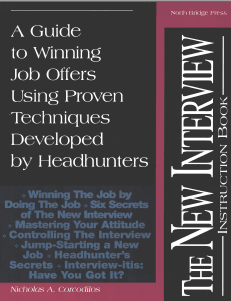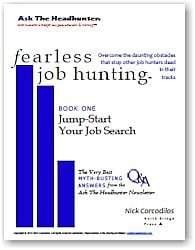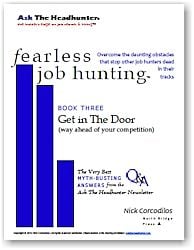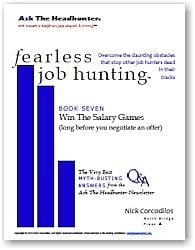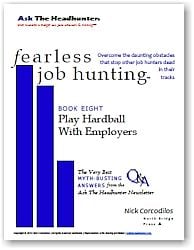In the March 22, 2016 Ask The Headhunter Newsletter, a reader wastes time with an employer who doesn’t negotiate.
Question
I received a job offer for $80,000, which is low for what my position gets in my industry. I responded that I’m excited about joining the team, and I counter-offered for $85,000, outlining what my value is, how I plan to benefit the company, and overall how the raise is justified. That’s my understanding of the proper way to negotiate — you must justify your counter-offer.
Instead of just turning down my counter-offer and staying at $80,000, which I would’ve gladly taken, they rescinded the offer completely. The hiring manager wouldn’t even respond to my calls or e-mails, even after he said he’d be glad to discuss any questions.
I spoke to friends who are hiring managers, who in turn asked other hiring managers, and the consensus was that it was a total shock and an anomaly to rescind the offer because I tried to negotiate it.
Is this becoming more common, or is this just plain bad hiring practice? Was I in the wrong to negotiate? The hiring manager did claim that he already pushed for the $80,000, which is the maximum they could offer. But anyone with negotiating experience knows that might be a negotiating technique of the employer.
In all, this experience scared me into never wanting to negotiate again, and I’m afraid I’ll never get a job that pays at least the average value for my position. I would love to know your thoughts!
Nick’s Reply
When employers talk money, job applicants are supposed to gratefully nod YES. When job applicants say MAYBE and try to negotiate, more and more we’re seeing employers say NO and withdraw offers altogether.
That’s when you should say GOODBYE, because negotiating is part of any business, and hiring people is business. Any employer that doesn’t respect the negotiating process — even if it declines to increase a job offer — is doing bad business.
Here we go again: Another rescinded (or retracted) job offer. (See Protect yourself from exploding job offers and Protect Your Job: Don’t give notice when accepting a new job.) What is up with human resources management?
Your story is an interesting twist, because your offer was retracted simply because you dared to negotiate it. But more troubling is that I’m seeing a shocking number of rescinded offers reported by readers.
Don’t beat yourself up about what just happened to you. As long as you do it respectfully, there is nothing wrong with negotiating. It’s part of business. I compliment you for negotiating responsibly. (See Only naïve wusses are afraid to bring up money.) Here are my thoughts:
- The manager is within his rights to not offer more money. But taking offense at a negotiation is puerile. As a job applicant, I’d walk away from this employer without another thought. As a headhunter, I’d never work with this employer again. (Employers should read Why you should offer job applicants more money.)
- The company’s HR department reveals it is meaningless, clueless, powerless, or all three. (See Why HR should get out of the hiring business.) Yes, I said HR. Even though you were dealing with a hiring manager, it’s the HR department’s job to ensure the hiring process is conducted in a businesslike way by all managers.
- The company’s Marketing and Public Relations departments are to be pitied because, while they are working to create a good image of their company before their customers and investors, hiring managers are tearing that image down in the company’s professional community. (I’m sure you’ll be sharing your story with your friends in your industry.)
- You have dodged a bullet. Better to know now that this person doesn’t negotiate, than after you take the job.
What this company did doesn’t make sense. But please consider that the risk of working with people whose behavior doesn’t make sense, doesn’t make sense!
Move on. There are good employers out there who know how to conduct business. Business between honest, smart people is always a negotiation. You did nothing imprudent or wrong. When someone won’t negotiate, they’re not worth doing business with.
We learn through negotiating. As you pointed out, negotiating by offering sound reasons for your counter-offer is a way to find common ground and a way to understand one another better. This kind of back-and-forth is the foundation of all commerce. It’s how we learn to work together. (See The ONLY way to ask for a higher job offer.)
This employer doesn’t get it. It never feels good when someone dumps us. It makes us question ourselves. But if you take a deep breath, I think you’ll realize that a company that refuses to have a dialogue — a negotiation — with you, doesn’t care about you. There can be no commerce in that case.
I think such appalling, irresponsible behavior by employers has become much more common, because HR now so dominates recruiting and hiring that hiring managers are less and less likely to understand even the most fundamental rules of engagement with job applicants. They do stupid things that cost their company money and good hires. Even worse, HR is so dominated by automated hiring tools, regulatory blinders, and “best practices” that even HR “professionals” are less and less likely to understand the basic rules of doing business.
Responsible business people don’t just walk away from a negotiation like this employer did. They respectfully close out the discussion. And if an employer makes an offer that the recipient tries to negotiate, the employer doesn’t withdraw the offer as its answer to a request for more money. The employer just says, No, no more money. Do you accept the original offer?
Don’t beat yourself up. You can always negotiate with good people. The rest aren’t worth worrying about or dealing with. I wish you the best.
Do you negotiate to get the best job offer you can? Did the employer pull the offer as a result? If you’re an employer, are you willing to negotiate with job applicants? How would you deal with an employer that doesn’t negotiate?
: :




 Contrary to the title of this Q&A, you’re not really afraid your millennial daughter is making a career mistake. You’re just afraid that you’re afraid she is. So I give you credit for starting a candid discussion about this, and for giving your daughter a chance.
Contrary to the title of this Q&A, you’re not really afraid your millennial daughter is making a career mistake. You’re just afraid that you’re afraid she is. So I give you credit for starting a candid discussion about this, and for giving your daughter a chance.



